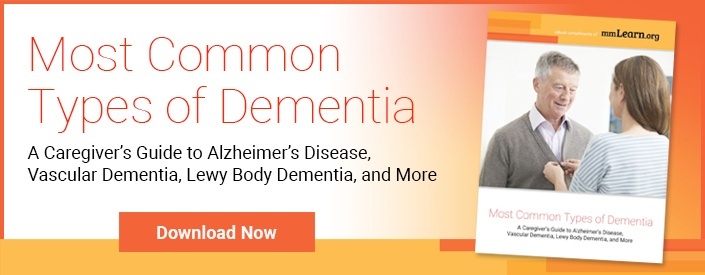 Dementia is an unpredictable degenerative condition that does not progress in a linear fashion.
Dementia is an unpredictable degenerative condition that does not progress in a linear fashion.
For seniors, it can be scary to experience losses in memory, function, and independence.
For caregivers, it can be frustrating and confusing to watch a loved one change to become sad, angry, agitated, or noncommunicative.
Learning about the stages of dementia and the disease’s typical trajectory can help caregivers and family members reach a place of understanding and acceptance.
Dementia Basics: Three Stages
Because dementia is a degenerative condition, it is sometimes difficult to identify when someone is in an early stage of dementia. As the condition progresses, people’s ability to care for themselves becomes compromised. But understanding the stages of dementia progression -- keeping in mind that it’s a just a guideline, not a rule -- can help caregivers cope.
Early Stage Dementia
The early stage of dementia often starts with small changes that may be hard to notice. The following are some signs that a loved one might have early stage dementia:
- They are experiencing memory loss—forgetting things, repeating themselves, or having difficulty finding the right word or expressing themselves with language.
- They are starting to behave differently. They might check out of conversations because they are having trouble following them.
- They find new places and situations confusing and are reluctant to try new things.
- They struggle with decision‑making, show poor judgment, or lose interest in activities they used to enjoy.
- They experience feelings of sadness, anxiety, frustration, and anger.
Individuals in the early stages of dementia are often able to engage in their normal daily activities and meet their responsibilities, although they may need more rest.
It is important at this stage to make sure that the senior and caregivers are talking with a doctor about the changes. Because communication skills can be compromised in later stages, this is a good time to discuss plans for end‑stage care; it’s an important part of making sure your aging loved one's voice is heard before they have trouble expressing their desires.
Middle Stage Dementia
The middle stage of dementia usually means the symptoms the person experiences in the early stage are getting more pronounced. Seniors may get lost easily even in familiar places, struggle with bathing and dressing, require reminders about eating and taking medication, need more help with meal preparation and managing their finances, feel agitated and/or restless, confuse time, have trouble sleeping, and believe things are real when they aren’t.
As the condition progresses, people living with dementia often have more trouble doing things for themselves. They’ll require more assistance with managing the tasks of daily living, and they may become frustrated and upset about this loss of control.
This middle stage can be especially challenging for caregivers. It’s a good time to connect to supportive resources, caregiver networks, and your loved one’s medical team to ensure that everyone has the information they need to cope with changing life circumstances and symptoms.
Late Stage Dementia
During the final and most severe stage of dementia’s progression, people experience more significant physical and cognitive decline. Most people with late stage dementia will have a need for full‑time nursing care. Symptoms of later stage dementia may include difficulty recognizing people, loss of speech, difficulty eating and swallowing, incontinence, and the appearance of restlessness. They may also be more vulnerable to infections and their side effects.
While people with late stage dementia may be less able to communicate verbally, they often respond positively to signs of affection: music, a soothing voice, a smile, or a gentle touch.
Living with Unpredictability
One of the most difficult things about caring for someone with degenerative dementia is its unpredictable timeline. On average, patients live 8-10 years from the emergence of symptoms, but many variables affect the progression of the disease and life expectancy: age of diagnosis, other illnesses, etc.
This uncertainty can be unsettling to caregivers who have no way of knowing which symptoms will emerge and when.
However, one thing is certain: Being a caregiver for a person with dementia requires patience, flexibility, and compassion. It involves lots of communication with medical professionals and learning about caregiving strategies, including dementia activities.
What do the experts say about how to prepare yourself for the roller-coaster ride of dementia?
Compassion Is Central
In this mmlearn caregiver video, Understanding and Approaching Challenging Behaviors in Dementia, Jonathan M. Evans, MD, MPH, CMD, quotes Sigmund Freud: “To understand is to forgive.” Evans’ central message is about cultivating a loving and compassionate approach to caring for someone with dementia.
The challenge often becomes understanding what people are telling us without words. “Behavior is communication,” says Evans. And behavior is not a disease with a drug cure.
He asks the viewer to imagine that your child has a rough morning at day care, and the teacher says they gave him a drug to calm him down. When you pick your child up, he is limp and groggy. If that was your child, you might be angry.
“When we are dependent on others for care, we most want to be accepted for who we are,” says Dr. Evans. Compassion means loving and accepting someone, even when they are challenging.
There is no “magic pill” for dementia. And even if we could give people a drug to have them behave exactly as we wanted them to, most of us wouldn’t want that. We want to be accepted and loved just the way we are. It’s the essence of being human.
“I know I’m not going to be the most easy patient to take care of,” says Evans, putting himself in the shoes of a person with dementia. “But I’m asking you right now to forgive me and accept me for who I am.”

